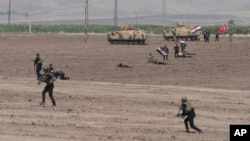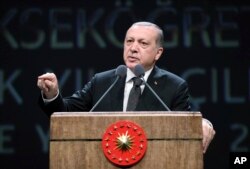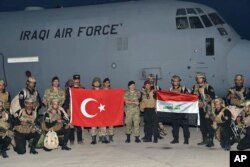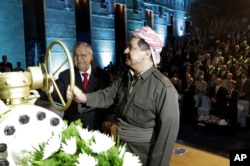Turkish President Recep Tayyip Erdogan has stepped up pressure on Iraqi Kurds, labeling their leaders as treacherous and warning that all military and economic options are now "on the table.”
The verbal attack comes as Turkish forces start unprecedented joint military exercises with their Iraqi counterparts around Iraq's Kurdish region. The military maneuvers Tuesday come one day after Iraqi Kurds voted on an independence referendum that drew objections from Iraq and Turkey, along with some other countries in the region, and the United States.
In a speech, Erdogan made clear the decision by Iraqi Kurdish regional President Massoud Barzani to proceed with the referendum was a personal slight.
"Until the very last moment, we weren’t expecting Barzani to make such a mistake as holding the referendum," he said. "Apparently we were wrong."
Erdogan added that the decision to hold the vote, which was made without consultation, amounted to treachery. Turkey saw the vote as not only destabilizing to the region, but as fueling secessionist demands from its own restive Kurdish minority.
In past years, Barzani and Erdogan had carved out a close partnership, paving the way for a groundbreaking rapprochement helped by deepening economic cooperation that overcame decades of mistrust between Iraqi Kurds and Ankara.
As Iraqi and Turkish forces started their joint military exercises close to the Iraqi Kurdish region, pictures of soldiers holding flags from both nations were released to the media, a move widely seen as sending a powerful message to Iraqi Kurds.
"This is happening for the first time since the military intervention in 2003; even before that, in the [Iraqi leader] Saddam [Hussein] era, I don't recall any joint Turkish-Iraq military exercises," said former Turkish diplomat Aydin Selcen, Turkey’s first consul general in Iraqi Kurdistan's regional capital, Irbil.
"And as it's going on right at the border — the Habur gates," he added. "... it should be watched closely.”
Turkish forces have been holding military drills on the Iraqi-Kurdish border for over a week. Erdogan Monday made clear their presence should be seen as a threat.
“Our military is not [at the border] for nothing.” He said, “We could arrive suddenly one night.”
Economic punishment
The Turkish president has also sharpened his language on economic sanctions against the Iraqi Kurds. He warned they could face “starvation” and financial destitution if Ankara decided to close a pipeline delivering oil from Iraqi Kurdistan to world markets through the Turkish Mediterranean port of Ceyhan.
The sale of half-a-million barrels of oil per day is a financial lifeline for the cash-strapped Iraqi Kurdish regional government.
Analysts suggest for now, Ankara is not ready to turn rhetoric into action.
“There is sizeable, significant domestic pressure on the [Turkish] government to react harshly and strongly. And this is a government that doesn't want to lose the support of the [Turkish] nationalists,” noted Sinan Ulgen, a visiting scholar with the Carnegie Europe in Brussels.
"The rhetoric is also part of Ankara’s deterrent strategy to prevent, now after the referendum, any concrete steps down that path to independence," he said.
“We have seen the hardening of rhetoric. But yet we have the [Turkish] prime minister's statement, which underlines the fact that Turkey is not going to war,” observed Selcen.
Turkey-Iraq thaw
The only concrete action taken by Ankara against the Iraqi Kurds to date is the closing of access to a Turkish satellite used by a Kurdish Rudaw television channel.
Shared hostility by Baghdad and Ankara to the Iraqi Kurdish independence vote appears to be providing the impetus for an easing of deep bilateral tensions.
“The fact they can now do joint military training demonstrates the antagonistic relationship that prevailed between Ankara and Baghdad has been finally overcome in the face of what they jointly see as a threat to regional stability,” argued Ulgen.
Last year, Erdogan dismissed Iraqi Prime Minister Haider al-Abadi as not being his equal in a war of words between the leaders. Ankara’s once-close link with the Iraqi Kurds was a major point of tension between the countries. Now the Iraqi and Turkish leaders have found common ground.
Wait-and-see game
According to Selcen, the current Turkish-Iraqi joint military exercises are seen as increasingly significant.
“The exercises follow through the statement by Iraqi Prime Minister Abadi that Iraqi Kurdistan should relinquish border gates and the airport to the central authority in Iraq," he said. "For that matter we should look closer to that joint military exercise and how it will develop in the coming days.”
"If Baghdad took control of Habur gate," he added, "it would remove a major headache for Ankara with much of its trade to the Middle East having to pass through Iraqi Kurdish-controlled territory."
Mutual economic dependency between the Iraqi Kurdish region and Turkey is seen as a factor in Ankara’s calculations on whether to take on any military or trade measures.
“Although rhetoric is getting tougher and harder," said Selcen, "the actions on the ground tell that we are moving more to the wait-and-see side rather than the 'go-to-war' school of thought. Common sense is prevailing at least for now. At the end of the day, these relations are beneficial to both sides.”







